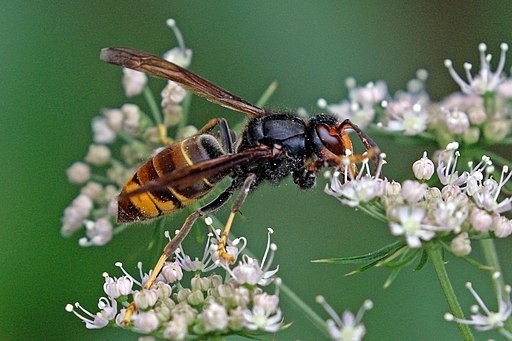Experts have raised concerns about the potential settlement of the Asian hornet in the UK due to an increase in sightings and nest discoveries. This invasive bee species has become a growing danger to bee populations and poses an alarming threat to biodiversity.

Record Number of Asian Hornet Sightings
There has been an unusual increase in sightings of the Asian hornet in the UK, with 22 documented cases in 2023 alone. This unprecedented rise contrasts the previous years, with only two recorded sightings each. There have been four sightings since 206, indicating an alarming trend.
Most of the sightings have been concentrated in Kent, causing conservationists to assume that the invasive species might have taken root in that area. The government responds by locating and eliminating every Asian hornet along with their nests to prevent them from surviving the winter and multiplying. Once these insects establish themselves, it would be a challenging task to eradicate them.
Bumblebee conservation expert Dave Goulson from the University of Sussex expressed his worry that the Asian hornet may have already established themselves in Kent. According to him, the discovery and destruction of nine nests this year is alarming, indicating that even a single undetected nest can lead to irrevocable establishment.
Asian hornets are native to Southeast Asia but can be transported in different parts of the world in cargo. They are currently widespread in Europe and are blown across the Channel.
Rising Threat of Invasion
Invasive insect species are one of the five major drivers of biodiversity loss and constitute a significant risk in the UK. A report was made by 86 biodiversity experts where they reviewed thousands of studies regarding the ecological and economic damages of species invasion. According to report co-author Professor Helen Roy of the UK Centre for Ecology and Hydrology, climate change could worsen the situation.
The experts also express major concern about the future threat from invasive alien species. It was found that 37% of the 37,000 alien species known today have been documented since 1970. The increased level of global trade and human travel largely caused this trend.
The arrival of Asian hornets in the UK would threaten native bees because the invaders dismember and consume them. Thriving hornets in France have caused widespread concern because of the significant number of insects that they prey upon. They are also known for frequently targeting honey bee hives where they enter and exit and feed their prey's thorax to their offspring.
Goulson also noted that the UK bee population is dwindling since it faces challenges such as habitat loss and widespread use of pesticides. The impact of this invasion also extends beyond the bee populations since it can also affect the broader ecosystem.
Insect charity Buglife CEO Matt Shardlow agreed with Goulson's concerns that he emphasized the importance of persistent control efforts. He reported that the recent actions in locating and removing the nests of Asian hornets had slowed the species' colonization. The abundance of different wasp species may also be affected by weather conditions, offering hope that the eradication programs combined with favorable weather can prevent the Asian hornets from establishing a permanent presence in the country.
RELATED ARTICLE : Stopping Asian Giant Murder Hornets, Scientists Race Against Time in Washington and British Columbia
Check out more news and information on Asian Hornet in Science Times.
© 2025 ScienceTimes.com All rights reserved. Do not reproduce without permission. The window to the world of Science Times.












